24+ Sample Affidavit of Domicile
-
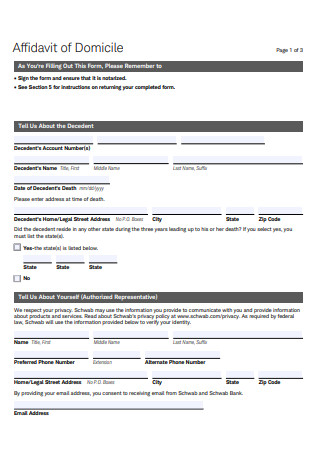
Affidavit of Domicile Template
download now -
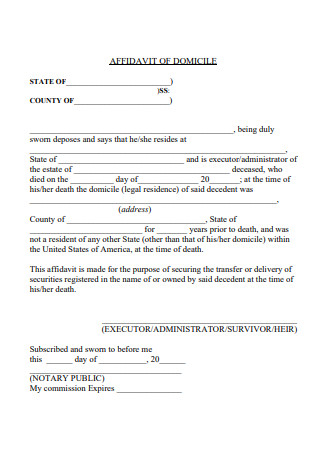
Basic Affidavit of Domicile
download now -
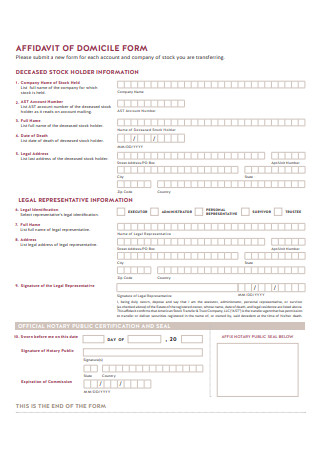
Affidavit of Domicile Form
download now -
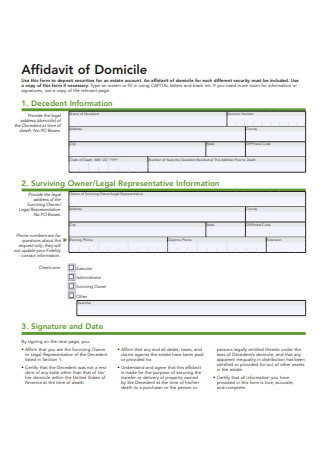
Formal Affidavit of Domicile
download now -
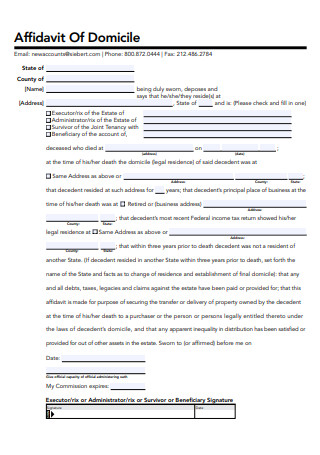
Sample Affidavit of Domicile
download now -
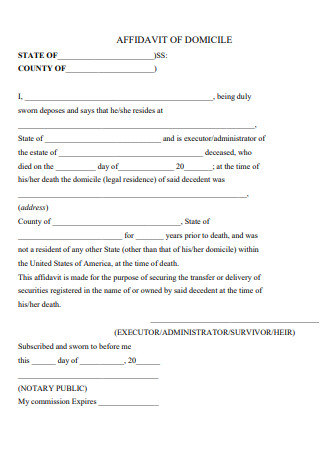
Printable Affidavit of Domicile
download now -
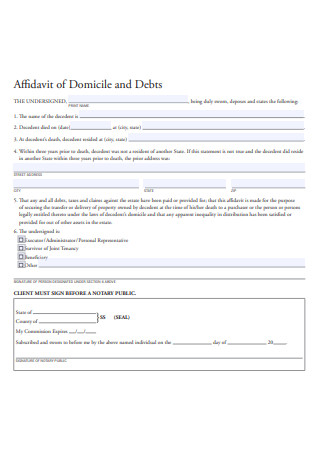
Affidavit of Domicile and Debts
download now -
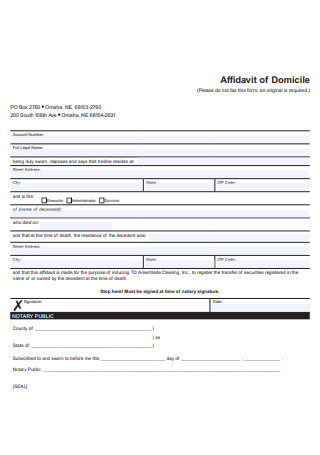
Affidavit of Domicile in PDF
download now -
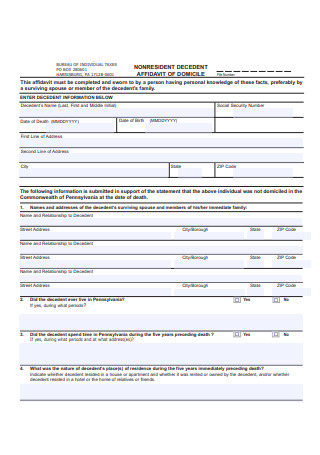
Non Resident Affidavit of Domicile
download now -
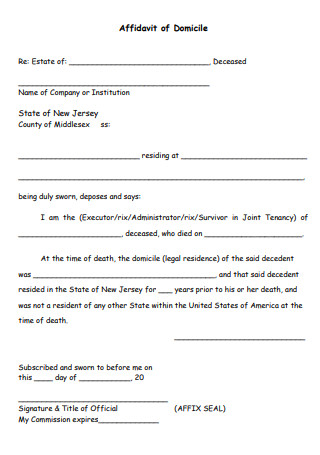
Simple Affidavit of Domicile
download now -
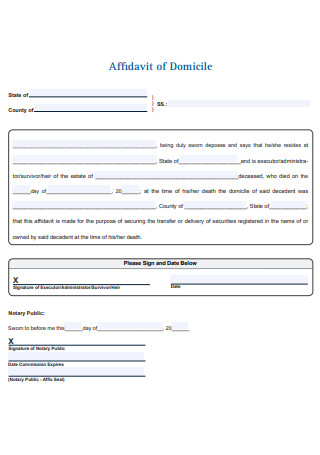
Affidavit of Domicile Example
download now -
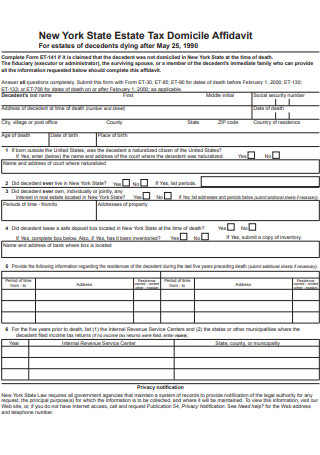
Tax Domicile Affidavit
download now -
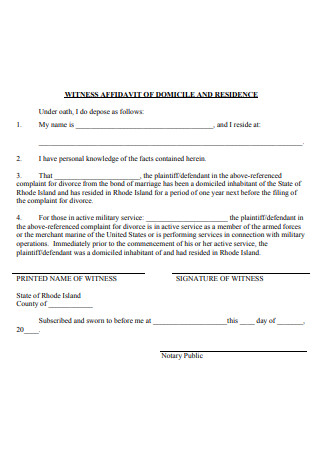
Affidavit of Domicile and Residence
download now -
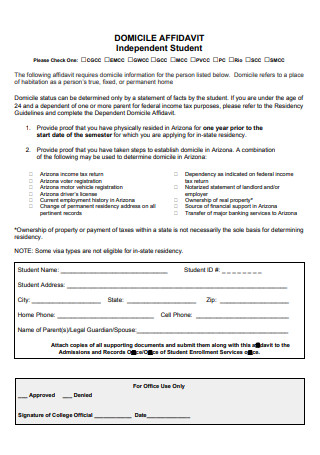
Independent Student Affidavit of Domicile
download now -
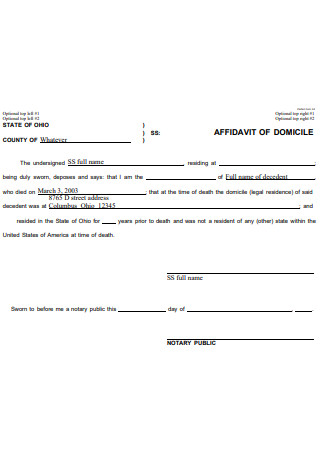
Standard Affidavit of Domicile
download now -
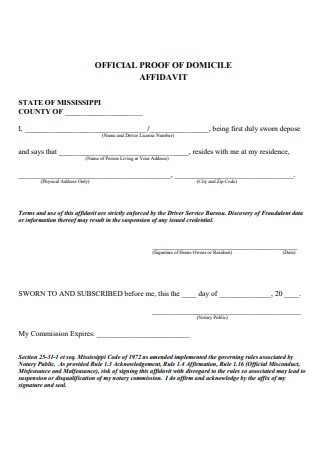
Official Proof of Affidavit Domicile
download now -
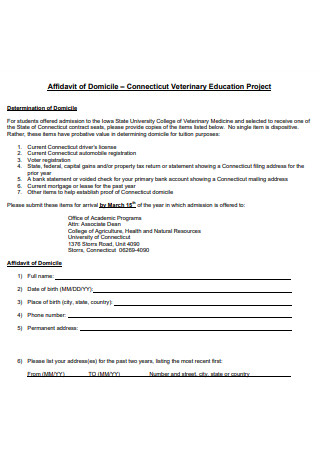
Affidavit of Domicile Education Project
download now -
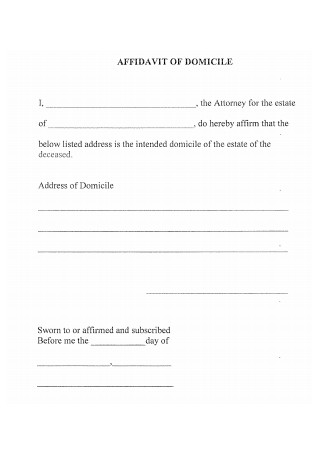
Draft Affidavit of Domicile
download now -
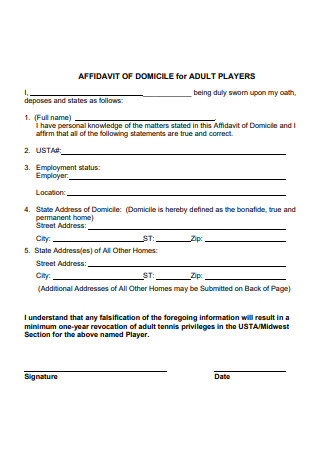
Affidavit of Domicile For Adult Players
download now -
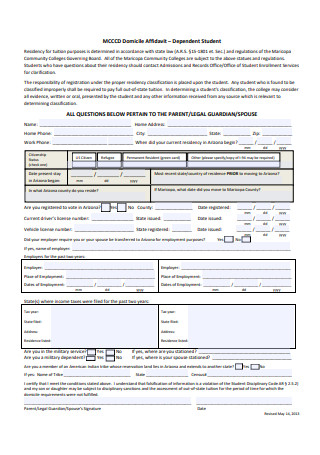
Affidavit of Domicile
download now -
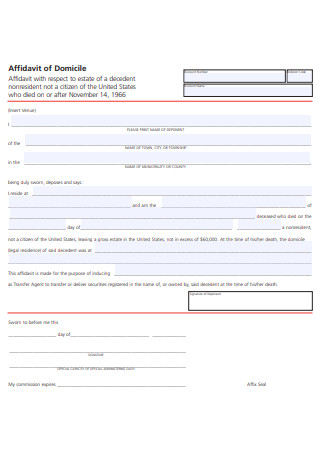
Affidavit of Domicile Format
download now -
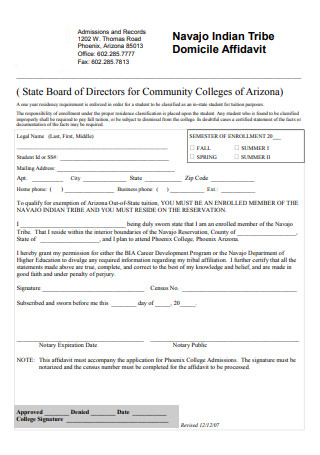
Tribe Affidavit of Domicile
download now -
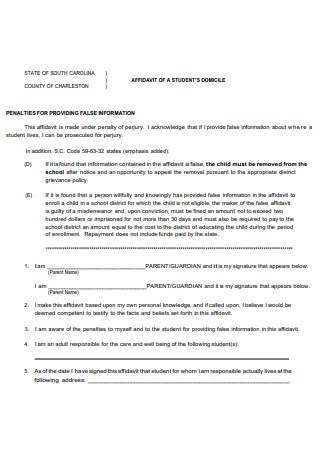
Affidavit of Student Domicile
download now -
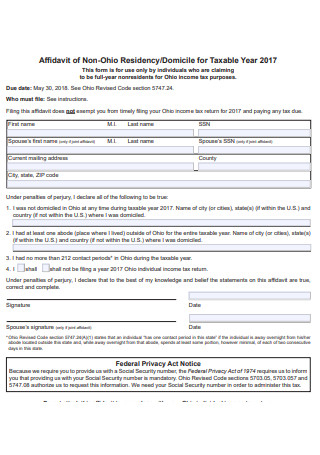
Affidavit of Residency Domicile For Taxable Year
download now -
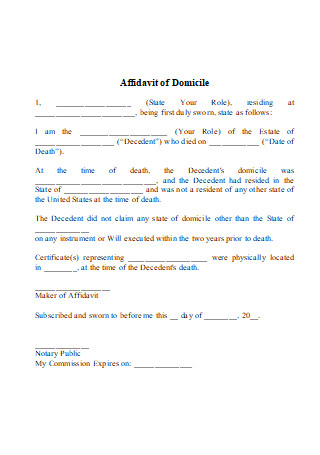
Affidavit of Domicile in DOC
download now
FREE Affidavit of Domicile s to Download
24+ Sample Affidavit of Domicile
What Is an Affidavit of Domicile?
Common Terms Used In Affidavit of Domicile
How To Create an Affidavit of Domicile?
FAQs:
When should you use an affidavit of domicile?
What is the difference between residence and domicile?
Can a person have two domiciles?
Can you change your domicile?
An affidavit of domicile may be requested at any time, and legal verification of the deceased person’s residency is necessary. When the executor needs to transfer specific assets that the deceased individual left behind, such as stocks or securities, there may be a problem. In order to prove where the person lived, the broker that processed the stocks may request an affidavit. The assets can be transferred pursuant to the will or the court’s directions once the affidavit is delivered.
This is where an estate attorney can help. Furthermore, you can find the affidavit to fill out on your own in a variety of sources. Such forms would be used to state where the dead lived and for how long. Some form providers will also help you fill out the required information and give you directions on how to get the document signed and notarized.
When legal verification of a person’s last abode is required, an affidavit of domicile is required. The majority of the instances involve an executor who needs to transfer certain assets that the deceased individual left behind, most notably stocks, securities, and real estate. You’ve come to the right place if you need to create an affidavit of domicile for yourself or a customer. You may quickly download a selection of legal templates from our website. There’s more to come! When you sign up for one of our membership programs, you will receive special benefits from us. Below is further information on this.
What Is an Affidavit of Domicile?
An affidavit of domicile is a legal document that is used after someone has died, this is used to further establish their primary place of residence. It is mostly created and sworn by the executor of the deceased’s estate and is required by their financial brokers in order to transfer securities ownership from the deceased to their beneficiaries. The executor of the estate also uses this during the probate process. This type of affidavit must be signed before a notary public and the executor of another person who signs the affidavit of domicile must swear, to the best of their knowledge, that all information that was stated on the affidavit is accurate, true and correct. If you find yourself in a situation where the deceased had more than one home, his or her domicile is a place where they have voted and paid taxes. If you are going to file an affidavit of domicile, a certified death certificate may also be required.
There are a handful of information that are needed in order for this form to be complete, the executor who will be creating the affidavit must have the details about the decedent or the original owner, the next of kin or the new owner, and the state and county in which the transaction or transfer will be taking place. The executor of the estate must also make a sworn statement regarding the stocks or bonds and the descendant’s wishes for these items. Like any other affidavits, before this affidavit can be filed and submitted or approved, it must be signed and notarized by all involved parties.
This information is required for an estate executor to transfer assets such as stocks or securities. Before transferring any assets, brokers will normally request an affidavit of domicile. Following the verification of residence, the procedure of transferring property according to the decedent’s will or state law can commence. This type of affidavit is also known as a Notarized Affidavit of Domicile, or sometimes mistakenly called an Affidavit of Residence which is a different form of legal document.
Common Terms Used In Affidavit of Domicile
There are various terms that you will find if you are going to use an affidavit of domicile. It is important to become familiar with these terms in order for you to know how to use, the meaning of these terms and who they are referring to, this can also help you to make your filling out of the affidavit faster as you already know what are the needed information of the affidavit most especially if the term is different from any other affidavits. Getting familiar with these terms also helps you to understand the purpose of the affidavit. Listed down below are the common terms in an affidavit of domicile: There are a handful of templates that you can find over the internet in order for you to create an affidavit of domicile. So if it is your first time or not, it is much easier if you can find a template that you can use as basis for your affidavit, or if you like creating one, it is also easier but remember to always consult an attorney about it. It is very important to take note of the common terms that are used in an affidavit so you have a grasp on what information should be included and what is needed in an affidavit. So do you have plans on creating one? Continue reading in order to know more on creating an affidavit of domicile.
An affidavit of domicile requires the identifying and necessary information about both the decedent and the executor of the estate or whoever the affiant of the affidavit to be legally valid. Depending on the state that you are filling it, there is certain information that may be required by them. So if you are not familiar with the estate laws of the state, best to consult with a probate lawyer to be sure that your affidavit of domicile is legally valid. With the following details, no matter what state you are living or filling it, generally an affidavit of domicile includes the following information:
A section about stocks and bonds may be included in some affidavits of domicile. You’ll need to know where all of the decedent’s stocks and bonds were when he or she died. While it is not needed, having this information will make the probate court function more smoothly.
Like any other affidavit, it is critical that the affiant make his or her own sworn statement, so if you are the one who will be claiming the assets and taking responsibility for the deceased’s assets, you must identify yourself in the affidavit, which is why it is also critical to have your contact information and your relationship to the decedent when filling out. In order to attest to the integrity and truthfulness of the affidavit you are making, you will also be needed to write a statement of truth. Perjury could ensue if you don’t follow this requirement.
The title of the affidavit should grab the reader’s attention. What better way to achieve it than to put the title at the top of the document, in a larger font size than the rest of the affidavit’s words? More importantly, the title must state clearly what the affidavit is about. After that, write the affidavit’s body, which should include information such as how the assets will be transferred, who will be the beneficiary, and so on.
Once you’ve finished the small estate affidavit in its entirety, see if you need two other people to witness the affidavit and your signature. These individuals must accompany you to the notary public’s office in order for the paperwork to be notarized. Always double-check your affidavit before signing it to make sure everything you’ve written is accurate. Double-check everything you can because if the court discovers flaws or lies in the affidavit, it might lead to perjury.
The procedures in your state dictate what happens next in the affidavit process. In other cases, all you have to do is provide the person who possesses the assets the completed affidavit and the death certificate, and they will release them. However, in other places, you must first acquire probate court approval, which may result in the issue of a more formal set of documents that you will use to claim the decedent’s assets. You can file the affidavit in person, by mail, or even online if your county allows it, but you’ll almost likely have to pay a fee if your county allows it.
If you are the executor or administrator of an estate and need to transfer stocks or bonds owned by the deceased, you should utilize this document. This document may also be required to be presented in probate court. When cashing in the deceased’s stocks or financial assets, the executor or administrator of the estate must present an Affidavit of Domicile. Investment firms and brokers use this form to transfer ownership of securities. Other documents, such as a copy of a death certificate and account numbers, may be requested by financial institutions.
A residence is, in general, a place where you live. This can be done for a long or short period of time. Domicile refers to the address of your permanent residence. A domicile is typically the location where you pay taxes and vote.
No. It is not feasible to claim residency in more than one state. It is illegal to have more than one domicile certificate at any given time. It is usually where a person pays taxes and casts his or her ballot.
Yes. You can lawfully change your domicile if you leave the state where you presently live and settle in a new area.
It is not as difficult as you may believe to prepare an affidavit of domicile. Use our affidavit template to make the process easier. Our affidavit template will come in handy whether you’re making one for yourself or for a client. So, what exactly are you waiting for? Get your hands on a copy right now!
How To Create an Affidavit of Domicile?
1. Know what should be included in an affidavit of domicile
2. Identify who the executor is and make a sworn statement
3. Provide a title and the content
4. In the presence of a notary or anyone else who is permitted, sign the affidavit.
5. The affidavit should be filed with the court.
FAQs:
When should you use an affidavit of domicile?
What is the difference between residence and domicile?
Can a person have two domiciles?
Can you change your domicile?
